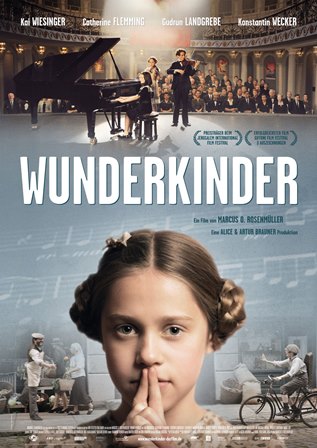
WUNDERKINDER
Germany, 2011
Gedeon Burkhard, Natalia Avelon.
Directed by Markus Rosenmuller.
Wunderkinder are child prodigies. The three children in this moving World War II drama are musically talented, two violinists and a pianist. They are around 12 years old.
The setting is a town in Ukraine. It is 1942. The population consists of Ukrainian traditional families as well as Jews. Two of the children are Jews. The other, who becomes friends with them, plays music with them, introduced by the local music teacher, herself Jewish. All seems to be calm despite the war. And that other girl is German, son of the local diplomatic representative who also owns the local brewery.
When German troops arrive, the purging of Jews begins. However, the three children are still in demand for performances. But, then, the German pact with Stalin broken, Russian troops arrive and situations are reversed. While the Jews are still cautious and have been sheltered in a country house by the benign German, it is the German family which now has to go into hiding. And, in a reverse of so many films where Jews are sheltered by sympathetic locals, it is now the German girl who is protected.
The film presents the possibilities of harmonious living but does not shirk the anti-Semitism which is quick to rise to the surface, the exercise of power by local officials (who then have to go into hiding when the politics change). However, it is the basic, common humanity which underlies this portrait of people who share values, who communicate by music. It is a sad story of childhood, with some tragic consequences.
Audiences will appreciate this different perspective on World War II, the experience of Ukraine, and the effect on children.